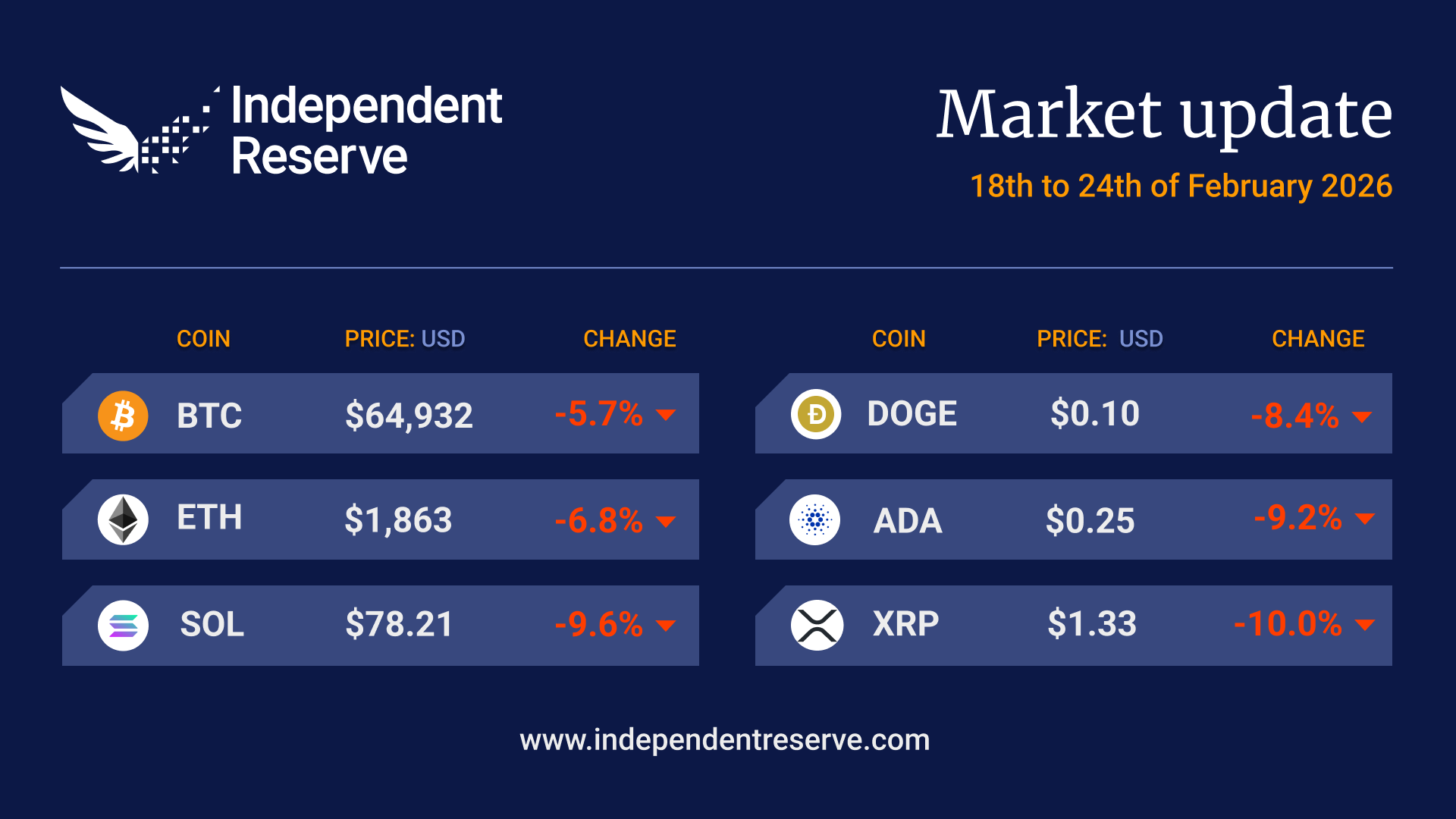In markets
The Bitcoin price surged 10% and nudged A$46.8K (US$30K) overnight on fake news of a spot Bitcoin ETF approval and fell quickly back to earth when the news was revealed to be the fantasy of a social media intern. The focus on a Bitcoin ETF approval has still been good for Bitcoin, which finishes the week up 2.9% to trade around A$44,775 (US$28,450). Ethereum was flat and finishes at A$2,510 (US$1,590). Ether is currently trading around a 15-month low versus Bitcoin and the lowest point since the shift to proof of stake. Elsewhere XRP lost 1.4%, Solana gained 8%, Cardano was flat, and Dogecoin increased 1.8%. The minutes of the US Federal Reserve show the policymakers agreed to maintain high-interest rates for an extended period. The Crypto Fear and Greed Index is at 47 or Neutral.

In headlines
Fake news
Bitcoin surged after Cointelegraph’s social media team erroneously tweeted that the SEC had approved the iShares spot Bitcoin ETF managed by BlackRock. Reuters then picked the story up, lending it credibility it didn’t have, and Bitcoin jumped 10%. After BlackRock denied the rumour, around US$100 million (A$157M) worth of positions were liquidated in an hour, leading to an apology from Cointelegraph and suggestions by crypto sleuth ZachXBT, the source of the rumour was a now-deleted anonymous account on Telegram. The only thing good to come out of the debacle was that BlackRock’s CEO Larry Fink then went on Fox Business to address the surge. “Some of this rally is way beyond the rumour,” Fink said. “I think the rally today is about a flight to quality, with all the issues around the Israeli war now, global terrorism. I think there’s more people running into a flight to quality, whether that is in Treasuries, gold or crypto, depending on how you think of it. And I believe crypto will play that type of role, as a flight to quality.”

Australian Treasury crypto regulations proposals
Assistant Treasurer Stephen Jones released the government’s “regulating digital asset platforms” consultation paper on October 16. It aims to regulate exchanges and service providers rather than cryptocurrencies itself and would do so under existing financial services laws, rather than by creating new crypto-specific rules. Platforms with more than A$5 million in assets would need to obtain an Australian Financial Services Licence and comply with various rules around custody, trading, staking and fundraising. Independent Reserve CEO Adrian Przelozny welcomed the news as a way to restore trust and drive investment but he added, “While it’s promising to see action and progress in this space, we urge the Government to maintain momentum with these changes and act swiftly to move to implementation.” Feedback on the proposals can be submitted by December 1.
All signs point to a Bitcoin ETF
The US Securities and Exchange Commission will not appeal a court decision that ruled the SEC had been wrong to knock back Grayscale’s application to convert its Bitcoin Trust into a Bitcoin ETF. Grayscale put out a statement saying that: “The court will now issue its final mandate within seven calendar days. The Grayscale team remains operationally ready to convert GBTC to an ETF upon the SEC’s approval.” There are other signs of movement too, with the SEC actually providing feedback to other Bitcoin ETF applicants, with ARK/21 Shares and Invesco Galaxy both updating their applications in response to comments. Bloomberg ETF analyst James Seyffart believes there is a “90% chance of approval by Ark’s Jan 10 deadline.” Don’t get too excited about the possible price impact, though, warns David Duong, head of institutional research at Coinbase, who believes the news is already partly priced in. In other ETF news, the ProShares Short ETH Strategy ETF starts trading in November.
Fingers crossed
We’re pleased to announce our nominations as finalists in not one, but two categories in the prestigious 2023 Blockies Awards: Digital Currency Exchange of the Year and Blockchain Organisation of the Year. Our CEO, Adrian Przelozny, has also been recognised for his outstanding leadership as a finalist for Blockchain Leader of the Year. But the accolades don’t stop there – we’re also finalists for the AusCham Business Excellence Award in Singapore. Thank you for your continued support on this incredible journey.

California moves towards crypto regulations
California Governor Gavin Newsom has signed Assembly Bill 39, which creates the Digital Financial Assets Act and will see proper crypto regulations established within 18 months. The bill gives the Department for Financial Protection and Innovation powers to create robust regulations, licensing and enforcement around crypto. Importantly, the Democrat governor signalled he was enthusiastic about crypto’s potential, stating: “California is a global hub of innovation, and we’re setting up the state for success with this emerging technology.”
Mastercard’s Aussie CBDC trial
Mastercard has completed a trial with the Reserve Bank of Australia to wrap CBDCs on different blockchains. The solution allows a CBDC holder to purchase an NFT representing the CBDC while at the same time locking the actual CBDC in the RBA’s platform. The trial was conducted in partnership with Cuscal and Mintable. Separately, Brad Jones, assistant governor (financial system) of the RBA talked up CBDCs in a speech to the AFR’s Crypto Summit titled “A Tokenised Future for the Australian Financial System”.

Sam Bankman Fried’s daze in court
Alameda CEO Caroline Ellison took to the stand to testify against FTX founder Sam Bankman Fried in the high-profile fraud case this week. Ellison (his former girlfriend) blamed the whole fiasco on SBF and said he “set up the systems” that allowed Alameda to misappropriate so much of FTX customer’s funds. Ellison also revealed that in the lead-up to the collapse, Alameda had US$13 billion of debt (A$20.5B) on its credit line with FTX and that she’d cooked the financial books to avoid disclosing that fact to crypto lender Gensis. Nishad Singh, the former engineering director testified to his reaction on learning Alameda had “borrowed” $13B: “I felt betrayed, something I’d put in blood, sweat and tears for five years turning out so horrible.” Harebrained schemes to save FTX included borrowing money from the crown prince of Saudi Arabia, “getting regulators to crack down on Binance” (who SBF blamed for the bank run) and borrowing even more money from BlockFi. Lots more happened, including SBF’s presidential ambitions, and you can read about it here. Former Assistant U.S. Attorney Kevin J. O’Brien told The Block, the case was moving quickly, which was a very bad sign for SBF. “Every defence lawyer looks for a toehold in reasonable doubt, just something they can argue to the jury, and it’s very hard to see how that’s going to materialise here,” he said.
Bits and pieces
The G20 finance minister and central bank governors have approved a roadmap for crypto asset regulations based on recommendations of both the International Monetary Fund (IMF) and the Financial Stability Board (FSB). Israeli police and intelligence organisations took action this week to freeze crypto accounts on Binance connected to terrorist outfit Hamas, while Tether has frozen funds in 32 crypto addresses linked to terror. Luxury car maker Ferrari will accept cryptocurrency payments for its sports cars in the US and Europe, saying the move was in response to customer demand and dealer requests.
Until next week, Happy Trading!


